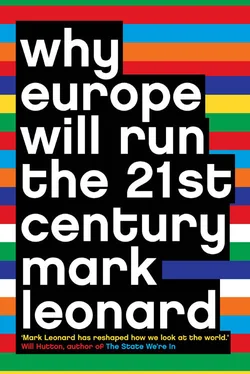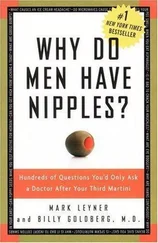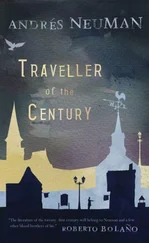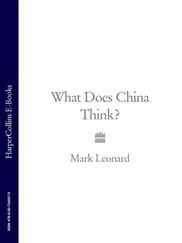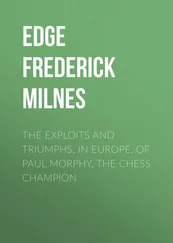Why Europe Will Run
the 21st Century
Mark Leonard
For Dick, Irène, Miriam and Gabrielle
Cover Page
Title Page Why Europe Will Run the 21st Century Mark Leonard
INTRODUCTION The Power of Weakness and the Weakness of Power: Why Europe Will Run the Twenty-First Century INTRODUCTION The Power of Weakness and the Weakness of Power: Why Europe Will Run the Twenty-First Century In the middle of Pennsylvania Avenue in Washington a middle-aged woman with a weather-beaten face and a brown wig sits on a milk crate. Surrounded by hand-painted placards calling for nuclear disarmament, Concepcion Picciotto hands out her cheaply produced leaflets to any passer-by who will stop to listen. This remarkable woman has been holding a vigil outside the White House day and night for twenty-one years – sleeping, in a sitting position, for just three hours a night, so as to avoid breaking the stringent DC vagrancy laws. It is impossible not to be moved by her conviction and moral rectitude; it is equally impossible not to be depressed by the futility of a cause that has robbed her of the best years of her life. It does not take long for most Americans to figure out that Concepcion is European. Like Concepcion’s faith in world peace, they see Europe’s belief in international institutions and the rule of international law as weak and unworldly – a luxurious delusion which post-9/11 America can no longer afford. In fact for many, Concepcion represents the distilled essence of the European position: lazy, free-riding, idealistic, and weak. She lives on American handouts of money and food, and enjoys the protection of the Washington Police Department without contributing a cent to pay for its upkeep. And yet she has the temerity to sit at the gates of the White House and complain about the manner in which her providers and protectors choose to conduct themselves. What is more, many Europeans would agree. The conventional wisdom is that Europe’s hour has come and gone. Its lack of vision, divisions, obsession with legal frameworks, unwillingness to project military power, and sclerotic economy are contrasted with a United States more dominant even than Rome at the height of the imperial republic, and not afraid to use force to get its way. We are told that if the American Empire is set to dominate the next fifty years, it is the Chinese and Indians who will take over the baton and dominate the second half of the century. But the problem is not Europe – it is our outdated understanding of power.
CHAPTER 1 Europe’s Invisible Hand
CHAPTER 2 ‘Divided We Stand, United We Fall’
CHAPTER 3 Europe’s Weapon is the Law
CHAPTER 4 The Revolutionary Power of Passive Aggression
CHAPTER 5 The European Way of War
CHAPTER 6 The Stockholm Consensus
CHAPTER 7 The European Rescue of National Democracy
CHAPTER 8 Europe at 50
CHAPTER 9 Brussels and the Beijing Consensus
CHAPTER 10 The End of the American World Order
CHAPTER 11 The Regional Domino Effect
APPENDIX The 109 Countries of the Eurosphere
NOTES
Acknowledgements
About the Author
Copyright
About the Publisher
INTRODUCTION The Power of Weakness and the Weakness of Power: Why Europe Will Run the Twenty-First Century
In the middle of Pennsylvania Avenue in Washington a middle-aged woman with a weather-beaten face and a brown wig sits on a milk crate. Surrounded by hand-painted placards calling for nuclear disarmament, Concepcion Picciotto hands out her cheaply produced leaflets to any passer-by who will stop to listen. This remarkable woman has been holding a vigil outside the White House day and night for twenty-one years – sleeping, in a sitting position, for just three hours a night, so as to avoid breaking the stringent DC vagrancy laws. It is impossible not to be moved by her conviction and moral rectitude; it is equally impossible not to be depressed by the futility of a cause that has robbed her of the best years of her life.
It does not take long for most Americans to figure out that Concepcion is European. Like Concepcion’s faith in world peace, they see Europe’s belief in international institutions and the rule of international law as weak and unworldly – a luxurious delusion which post-9/11 America can no longer afford. In fact for many, Concepcion represents the distilled essence of the European position: lazy, free-riding, idealistic, and weak. She lives on American handouts of money and food, and enjoys the protection of the Washington Police Department without contributing a cent to pay for its upkeep. And yet she has the temerity to sit at the gates of the White House and complain about the manner in which her providers and protectors choose to conduct themselves.
What is more, many Europeans would agree. The conventional wisdom is that Europe’s hour has come and gone. Its lack of vision, divisions, obsession with legal frameworks, unwillingness to project military power, and sclerotic economy are contrasted with a United States more dominant even than Rome at the height of the imperial republic, and not afraid to use force to get its way. We are told that if the American Empire is set to dominate the next fifty years, it is the Chinese and Indians who will take over the baton and dominate the second half of the century.
But the problem is not Europe – it is our outdated understanding of power.
For all the talk of American Empire, the last two years have been above all else a demonstration of the limits of American power. America’s economic lead over the rest of the world has disappeared (in 1950 its GDP was twice the size of Western Europe’s and five times Japan’s; today its GDP is the same size as the EU’s and less than double that of Japan’s 1 ); and its political power is waning (its failure to secure support from Europeans, and even from countries as economically dependent on the USA as Mexico and Chile, showed that the price for saying no to the United States has been going down). In fact American dominance is only clear-cut on two levels: the ability to fight and win intensive conventional wars, and the ubiquity of American popular culture. 2 Joseph Nye has characterized these two kinds of power as ‘hard’ and ‘soft’: the ability to get your way by coercion and attraction. 3 Both are declining currencies.
Terrorism and weapons of mass destruction allow the desperate and weak to neutralize the superpower’s military machine. 4 And by constantly talking of countries as rogue states and threatening them with military attack, the Bush Administration actually encourages them to adopt these tactics. What is more, as the administration becomes obsessed with ‘Hard Power’, it further erodes American ‘Soft Power’ by replacing memories of America as saviour with fear of the instability its war on terror is causing. As David Calleo says: ‘Where promiscuous Europe sees a world where everybody is a potential friend, martial America lives in a world where every independent power is a potential enemy.’ 5 The paradox is that the more this Janus-faced empire flouts its strength, the less it is able to achieve its goals on the world stage.
To understand the shape of the twenty-first century, we need a revolution in the way we think about power. The overblown rhetoric directed at the ‘American Empire’ misses the fact that the US reach – militarily and diplomatically – is shallow and narrow. The lonely superpower can bribe, bully, or impose its will almost anywhere in the world, but when its back is turned, its potency wanes. The strength of the EU, conversely, is broad and deep: once sucked into its sphere of influence, countries are changed forever. For fifty years, under the cover of an American security blanket, Europe has been creating a ‘community of democracy’ and using its market size and the promise of engagement to reshape societies from the inside. As India, Brazil, South Africa, and even China develop economically and express themselves politically, the European model will represent an irresistibly attractive way of enhancing their prosperity whilst protecting their security. They will join with the EU in building ‘a New European Century’.
Читать дальше
